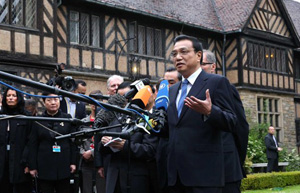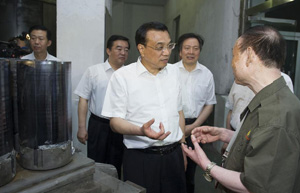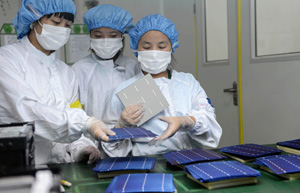 | ||
|
Editor's note:The European Union's endorsement of an agreement that settled a dispute with China over solar panel sales in the EU should be credited mostly to the Chinese government's "great concerns" about the matter and "efficient communication" with the EU. The resolution proved to be a good example of defusing trade frictions through high-level communications so much so that experts are now calling for a regular mechanism in resolving rising disputes. | ||
|
 | ||
|
Dialogue defuses EU, China solar case High-level contacts helped two sides to resolve potentially damaging issue. The recent solar panel resolution between China and the European Union proved to be a good example of defusing trade frictions through high-level communications so much so that experts are now calling for a regular mechanism in resolving rising disputes. "The settlement of the solar panel dispute cannot teach us too much. We should set up a specialized crisis management mechanism, incorporating trade agencies, enterprises and business representatives, to deal with rising trade frictions with the EU," said Feng Zhongping, vice-president of the China Institutes of Contemporary International Relations.
|
The EU started anti-dumping investigations into solar panels from China in September 2012 and an anti-subsidy investigation into the same products in November 2012. The case is the largest trade investigation that the European Commission has launched with Chinese exports worth 21 billion euros ($27.9 billion) in 2011. Starting from June 6, the Commission imposed provisional anti-dumping duties of 11.8 percent on imports of solar panels, cells and wafers from China until Aug 6, from when on the duty would be raised to 47.6 percent if the two sides had not been able to sort out the dispute through negotiation. Chinese Premier Li Keqiang repeatedly expressed great concern about the case during his May visit to Europe and reiterated China's stance over a June telephone talk with European Commission President Jose Manuel Barroso.
 |
 Li urges innovation in PV sector Chinese Premier Li Keqiang urged Chinese photovoltaic companies to be stronger in adversity by strengthening innovation and tapping both overseas and domestic markets. During an inspection tour to Hebei province, Li visited Jinglong Company, a large PV firm in Xingtai city. Li said the Chinese sector boasts international competitiveness, and that the country firmly opposes trade protectionism. "We need to stabilize overseas markets while activating the domestic market to revitalize China's PV industry," said Li. The premier warned it will not be easy for the sector to keep being a leading player in the international market. He urged PV companies to grasp core technology, gain advantages through innovation and grow stronger in adversity.
|
 | ||
|
Aug 6, 2013 |
|
|
June 4, 2013 |
|
|
May 26, 2013 |
|
|
May 24, 2013 |
A coalition of over 580 EU solar firms protested against anti-dumping duties against Chinese solar products. At least 14 EU member states voted against such a proposal. |
|
May 23, 2013 |
The Ministry of Commerce sent a delegation to negotiate with the European Commission on the pricing of PV products. |
|
May 22, 2013 |
|
|
Mar 5, 2013 |
EU ordered registration of solar PV imports from China |
|
Feb 28, 2013 |
The EU launched an anti-dumping investigation into imports of solar glass from China. |
|
Nov 8, 2012 |
|
|
Sept 25,2012 |
|
| |||
|
The EU and China have settled a trade fight over solar panels that upset relations between two of the world's largest economies and threatened to spread to other industries in a spiral of tit-for-tat retaliation. The settlement – known as a price undertaking – is on terms favourable to Beijing. It will allow Chinese companies to export to the EU up to 7 gigawatts per year of solar products without paying duties, provided that the price is no less than 56 cents per watt.
----- Fiancial Times |
The deal is not likely to please all parties. While the European Commission has not announced the full terms, media reports indicate that the minimum price for Chinese panels has been set at 74 cents per watt -- a much lower price than had been sought by European manufacturers. De Gucht, the EU trade chief, is bound to face questions from producers over the price minimum. He must also move to patch up fissures between EU member countries -- some of which had publicly questioned the wisdom of taking China to task over solar panels. ----- CNN |
European Union and Chinese negotiators reached an agreement to curb EU imports of solar panels from China in exchange for exempting the shipments from punitive tariffs.
|
The EU Minimum Price Benefits Chinese Solar Companies. On August 3rd the EU commission issued an amendment to Regulation (EU) No 513/2013, originally designed to establish a provisional anti-dumping duty on imports of crystalline silicon photovoltaic modules and key components originating in or consigned from the People’s Republic of China. Based on reduced numbers, and the fact that Chinese modules will still be cheapest, demand should be healthy at least for the quota retainers. ----- Solar PV Investor |
|
The settlement was made on terms favourable to the Chinese. Chinese officials are reviewing the production and import costs levied by some of the world’s largest drug companies and the prices set by international producers of infant milk formula. ----- The Guardian |
The EU had planned to impose hefty tariffs from August 6 but, wary of offending China's leaders and losing business in the world's No 2 economy, a majority of governments, led by Germany, opposed the plan, allowing for the compromise deal. ----- Reuters |
By ending a multibillion-dollar antidumping dispute over solar panels, the European Union and China prevented one of the biggest trade spats between two of the world's largest economic powers from spiraling into a broader trade war.
----- The Wall Street Journal |
China's victory over the weekend in its solar panel dispute with the European Commission has exposed glaring gaps in European unity on trade issues. And it casts a harsh light on the prospects for the United States and Europe to cooperate on trade policy.
|
|
| ||
|
China's high-level communication played a key role in solving the China-EU photovoltaic trade dispute quickly as the dispute has thus been highlighted. On the other hand, however, it reflects the lack of a communication platform, especially in economic trade. The case signals the necessity of exploring new mechanisms to avoid possible trade wars. Both sides should be able to communicate fully before going through a trade remedy in order to achieve a win-win result in solving trade disputes in the future.>>>
Chen Xin director of the economics department in the Chinese Academy of Social Sciences Institute of Europe |
The efficient settlement of the China-EU solar row should be credited first and foremost to the active consultations and negotiations between the two sides at various levels based on mutual respect and mutual benefit. All levels of the Chinese government -- including the State Council and the Commerce Ministry -- and 95 Chinese solar companies were involved in this deal. If the EU had insisted on going their own way, it wouldn't have been good for them. China has been growing too fast in recent years to be a sitting duck. >>>
He Maochun director of the Economy and Diplomacy Research Center, Tsinghua University |
There are several reasons underlying the settlement of the China-EU solar panel dispute, which was reached in such a short time. First, both sides had their own self-interest at stake. China and the EU are part of the same production chain, but in different divisions. There were also two different voices inside of the EU. The European Commission shouldn't have considered one voice only. Second, more ideas came during the communication process. Most importantly, a new model focusing on high-level conversations between China and the EU was utilized to solve the dispute.>>>
Cui Hongjian director of the European department in the China Institute of International Studies |
|
After weeks of intensive talks, I can announce that I am satisfied with the offer of a price undertaking submitted by China's solar panel exporters. This is the amicable solution that both the EU and China were looking for. Karel De Gucht |
I am impressed that Premier Li is diplomatically active and forceful in approaching the problems and that he is solution-oriented. Duncan Freeman senior researcher of Brussels Institute of Contemporary Chinese Studies |
Free trade in automobiles was good for the environment 30 years ago. The same is true of trade in solar equipment today. Westerners should thank Chinese panel producers for their contribution to keeping solar power viable, not penalize them through protectionist anti-dumping measures. Jeffrey Frankel a professor at Harvard University |















